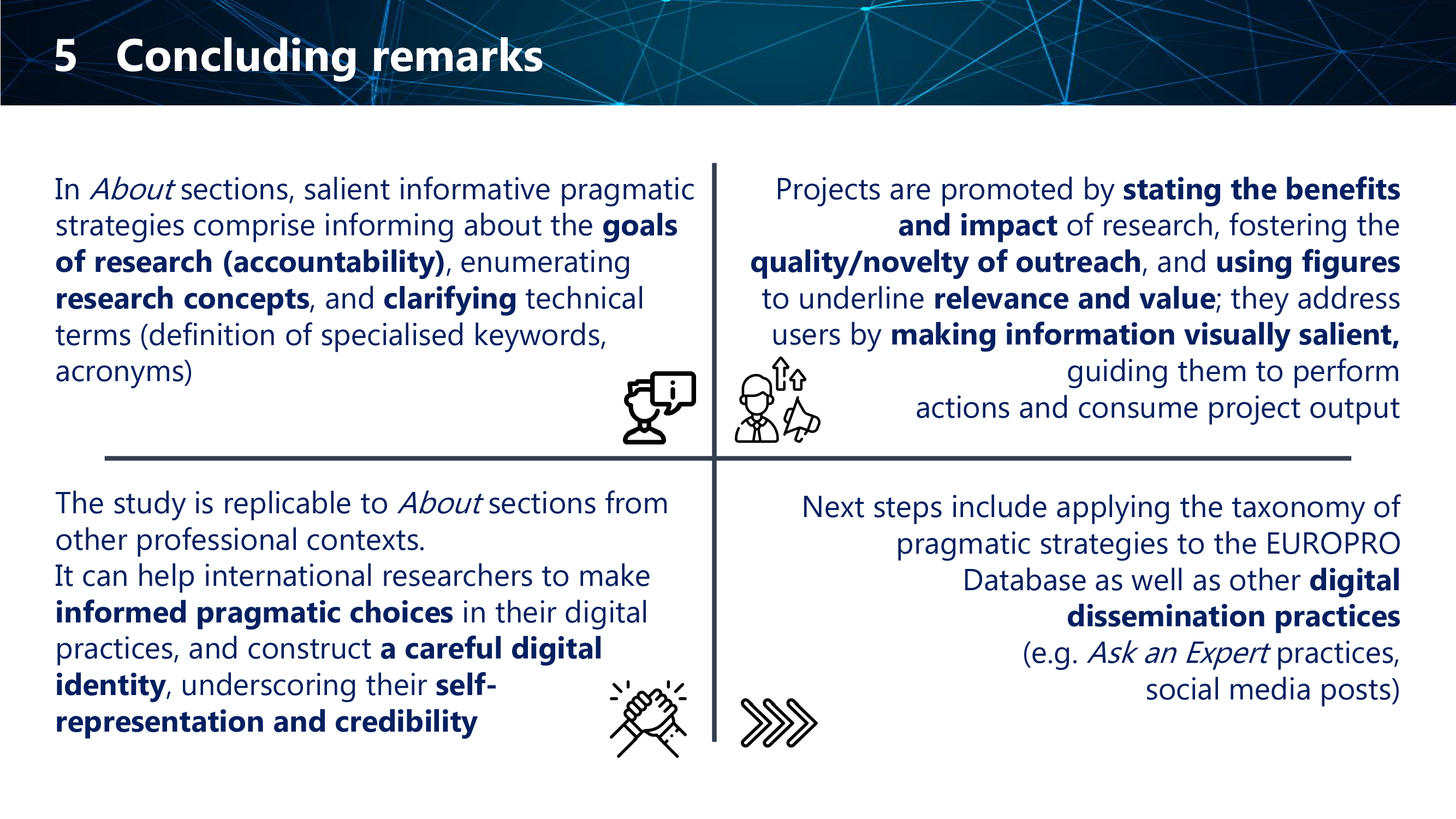AESLA 2025: Daniel Pascual analyses the pragmatic dimension of the About sections of research project websites

Our team member Dr Daniel Pascual was a participant in the 42nd International Conference of the Spanish Association of Applied Linguistics (AESLA), hosted by the University of the Balearic Islands (UIB) and held in Palma de Mallorca (UIB), from the 2nd to the 4th of April 2025.
In his paper, entitled "Goals, Concepts, Figures: The Pragmatic Construction of About Sections within Research Project Websites", he reported on the findings from his pragmatic analysis, where he examined a sample of About pages from a range of international research projects that partook in Horizon 2020. Amongst other things, his presentation served to shed light on the way researchers craft their digital identities in national and international contexts.
You can read Dr. Daniel Pascual’s abstract in what follows:
Goals, Concepts, Figures: The Pragmatic Construction of About Sections within Research Project Websites
Websites created by individual and collective users demand the construction of a fine-grained digital identity that rests upon notions such as self-representation, self-branding and visibility. The people behind these websites are introduced throughout their different sections, with About section being a main showcase. The functions and features of collective About sections have been explored in various specific professional contexts, such as banks (Casañ-Pitarch 2015) and energy companies (Tenca 2018) in corporate communication, and universities (Caiazzo 2014) in institutional communication. In scholarly contexts, the case of research projects is a prolific scenario for scientific dissemination and knowledge transfer delivered by a team of institutions and researchers. Against this backdrop, About sections have also been analysed drawing on the frameworks of ‘evaluation’ (Lorés 2020) and ‘genre studies’ (Mur-Dueñas 2023). Yet, the gap remains to investigate them from the perspective of pragmatics. This paper
intends to fill this gap by identifying and analysing the salient ‘pragmatic strategies’ in the About sections of research project websites. Drawing on Pascual’s (2023) theoretical definition and methodological procedure, these strategies are classified into three macrocategories: informative, promotional and interactional. The About sections of 30 international research projects participating in the Horizon2020 programme were selected from the EUROPRO Digital Corpus (Pascual, Mur-Dueñas and Lores 2020),
and the software tool NVivo 12 was used to consistently analyse the use of pragmatic strategies and achieve methodological rigour.
Results on the distribution of the three pragmatic macrocategories in About sections unveil a predominance of informative and promotional strategies over interactional ones. Frequencies of an inventory of 27 specific pragmatic strategies are also offered, retrieving examples from the corpus to illustrate their deployment. Findings show that research groups often intend to inform about the aim of research, enumerate research- and topic-oriented elements, and clarify technical and scientific terms within the informative macrocategory; they recurrently state the benefits and impact of research, emphasise the quality and novelty of outreach, and underline relevance and value through figures to promote their projects; and they make information visually salient as the prevailing interactional strategy, cutting across informative and promotional ones. Overall, this piece of research may be beneficial for researchers at national and international contexts who wish to make informed pragmatic choices in digital practices such as websites, in general, and About sections, in particular. Insights from this study could help them construct a careful digital identity, underscoring their self-representation and credibility.
References:
Caiazzo, L. (2014). Emerging conventions in the verbal component of the ‘About’ page of British university websites. In P. Evangelisti Allori, J. Bateman, & V.K. Bhatia (eds.), Evolution in Genre: Emergence, Variation, Multimodality (pp. 307-325). Peter Lang.
Casañ-Pitarch, R. (2015). The genre ‘about us’: A case study of banks’ corporatewebpages. International Journal of Language Studies 9 (2), 69-96.
Lorés, R. (2020). Science on the web: The exploration of European research websites of energy-related projects as digital genres for the promotion of values. Discourse, Context & Media 35, 100389. https://doi.org/10.1016/j.dcm.2020.100389
Mur-Dueñas, P. (2023). Exploring researchers’ digital professional and discursive practices: A genre analysis of international research project websites. Ibérica 45, 79-107. https://doi.org/10.17398/2340-2784.45.79
Pascual, D. (2023). Scientific dissemination and professional practices through digital media: The study of pragmatic strategies in the communication of international research projects. Unpublished doctoral dissertation. Universidad de Zaragoza. https://zaguan.unizar.es/record/126892/files/TESIS-2023-125.pdf
Pascual, D., Mur-Dueñas, P. and Lorés, R. (2020). Looking into international research groups’ digital discursive practices: Criteria and methodological steps in the compilation of the EUROPRO digital corpus. Research in Corpus Linguistics 8 (2), 87-102. https://doi.org/10.32714/ricl.08.02.05
Tenca, E. (2018). Remediating corporate communication through the web: The case of About Us sections in companies’ global websites. ESP Today 6 (1), 84-106. https://doi.org/10.18485/esptoday.2018.6.1.5
